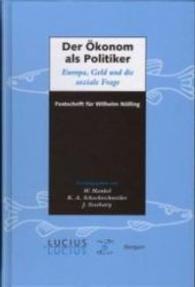- ホーム
- > 洋書
- > 英文書
- > History / World
基本説明
Discusses how the events of 1989 are remembered and have affected China's international relations and diplomacy; how human rights, law enforcement, policing, and liberal thought have developed over two decades.
Full Description
The 1989 pro-democracy movement in China constituted a huge challenge to the survival of the Chinese communist state, and the efforts of the Chinese Communist party to erase the memory of the massacre testify to its importance. This consisted of six weeks of massive pro-democracy demonstrations in Beijing and over 300 other cities, led by students, who in Beijing engaged in a hunger strike which drew wide public support. Their actions provoked repression from the regime, which - after internal debate - decided to suppress the movement with force, leading to a still-unknown number of deaths in Beijing and a period of heightened repression throughout the country. This book assesses the impact of the movement, and of the ensuing repression, on the political evolution of the People's Republic of China.
The book discusses what lessons the leadership learned from the events of 1989, in particular whether these events consolidated authoritarian government or facilitated its adaptation towards a new flexibility which may, in time, lead to the transformation of the regime. It also examines the impact of 1989 on the pro-democracy movement, assessing whether its change of strategy since has consolidated the movement, or if, given it success in achieving economic growth and raising living standards, it has become increasingly irrelevant. It also examines how the repression of the movement has affected the economic policy of the Party, favoring the development of large State Enterprises and provoking an impressive social polarisation. Finally, Jean-Philippe Béja discusses how the events of 1989 are remembered and have affected China's international relations and diplomacy; how human rights, law enforcement, policing, and liberal thought have developed over two decades.
Contents
Introduction: June 4th 1989: A Watershed in Chinese Contemporary History 1. June Fourth: Memory and Ethics 2. The Chinese Communist Party and 4 June 1989 —Or how to get out of it and get away with it 3. The Impact of the June 4th Massacre on the pro-Democracy Movement 4. The Chinese Liberal Camp in Post-June 4th China 5. Wang Xiaobo and the No Longer Silent majority 6. The Seeds of Tiananmen: Reflections on a Growing Chinese Civil Rights Movement 7. The practice of law as conscientious resistance: Chinese weiquan lawyers' experience 8. The Politicisation of China's Law-Enforcement and Judicial Apparatus 9. The Enduring Importance of Police Repression: Laojiao, the Rule of Law and Taiwan's Alternative Evolution 10. The Impact of the Tiananmen Crisis on China's Economic Transition 11. The Tiananmen Incident and the Pro-Democracy Movement in Hong Kong 12. How China managed to de-isolate itself on the international stage and re-engage the world after Tiananmen 13. China and International Human Rights: Tiananmen's Paradoxical Impact 14. A Shadow over Western Democracies: China's Political Use of Economic Power







